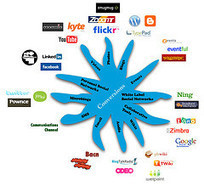People are complex. We need a more nuanced approach to predicting job performance.

|
Scooped by Barry Deutsch |
Very good research article in the MIT review.
My experience over 30 years of hiring and performance management consulting, and over 1000 executive search projects is that there is NO test that is predicative of future performance.
The intellectual tests do not predict future performance. They simply give you a perspective on raw intelligence – the ability to logically and rationally process information.
The personality assessments do not predict performance – they simply give you insight into a person’s preferred behavior/communication style in a work setting. Most of the tests are easily manipulated by the candidate into answering questions or checking words that the hiring manager wants to hear – not the real candidate.
Both of these are still useful tools and insights even with their flaws.
However, the ONLY way to predict future performance is to conduct a performance or success based structured interview that correlates with the outcomes desired in the role. Adding role plays, homework, and working/practical sessions/real case studies – along with deep and intrusive reference checking can boost interview accuracy from what most of the studies show is basically a 50/50 success rate into the 80-90 percent range.



 Your new post is loading...
Your new post is loading...












Koop pillen om af te vallen
koop ozempic 0.25 mg
acquista saxenda
acquista subutex online
acquista ozempic
acquista qsymia
koop ozempic Amsterdam
koop ozempic Rotterdam
koop ozempic Eindhoven
mounjaro koop
zepbound koop
rybelsus koop
saxenda koop
wegovy koop
acquisto ozempic
ozempic prezzo
acquistare ozempic 0.5mg
acquistare ozempic senza ricetta
acquistare ozempic 1mg
ozempic comprar 1mg
comprar ozempic 1mg
ozempic comprar sin receta
ozempic comprar online
ozempic comprar
comprar ozempic 2mg
comprar mounjaro
kaufen ozempic Deutschland
kaufen ozempic
kaufen ozempic 0.25 mg
kaufen ozempic 0.5 mg
kaufen ozempic 1 mg
kaufen ozempic 2 mg
acheter ozempic
Acheter Ozempic 0.25 mg
Acheter Ozempic 0.25 mg MAINTENANT
Acheter Ozempic 0.5 mg MAINTENANT
ozempic perte de poid
acheter adipex p
acheter ozempic
acheter qsymia
acheter saxenda en ligne
https://ozempickopen.com/
https://ozempickopen.com/shop/
https://ozempickopen.com/product-categorie/weight-loss-medications/
https://ozempickopen.com/product/koop-ozempic-0-25mg/
https://ozempickopen.com/product/koop-ozempic-0-5mg/
https://ozempickopen.com/product/koop-ozempic-1mg-online/
https://ozempickopen.com/product/koop-ozempic-2mg-online/
https://ozempickopen.com/product/koop-adipex-online/
https://ozempickopen.com/product/mounjaro-kopen/
https://ozempickopen.com/product/saxenda-kopen/
https://ozempickopen.com/product/koop-wegovy-online/
https://ozempickopen.com/product/koop-zepbound-online/
https://ozempickopen.com/product/koop-rybelsus-online/
https://kaufenozemp25mg.com/
https://kaufenozemp25mg.com/geschaft/
https://kaufenozemp25mg.com/product/ozempic-kaufen-0-25mg/
https://kaufenozemp25mg.com/product/ozempic-kaufen-ohne-rezept-0-5-mg/
https://kaufenozemp25mg.com/product/ozempic-kaufen-schweiz-1mg/
https://kaufenozemp25mg.com/product/ozempic-kaufen-2mg-online/
https://ozempiccomprar1mg.com/
https://ozempiccomprar1mg.com/compra-ahora/
https://ozempiccomprar1mg.com/product/ozempic-comprar-sin-receta/
https://ozempiccomprar1mg.com/product/comprar-ozempic-online/
https://ozempiccomprar1mg.com/product/comprar-ozempic/
https://ozempiccomprar1mg.com/product/comprar-ozempic-2mg/
https://ozempiccomprar1mg.com/product/comprar-mounjaro-sin-receta/
https://acquistoozempic.com/
https://acquistoozempic.com/acquista-il-tuo-iniettabile-ozempic/
https://acquistoozempic.com/Prodotto/acquista-ozempic-0-25-mg/
https://acquistoozempic.com/Prodotto/acquisto-ozempic-senza-ricetta/
https://acquistoozempic.com/Prodotto/acquista-ozempic-1mg/
https://acquistoozempic.com/Prodotto/acquisto-ephedrine/
https://acquistoozempic.com/Prodotto/acquista-phentermine-online/
https://acquistoozempic.com/Prodotto/acquista-saxenda-online/
https://acquistoozempic.com/Prodotto/acquisto-wegovy-online/
https://acheteractiskenan.com/product/acheter-adipex-p/
https://acheteractiskenan.com/Produit/ozempic-sans-ordonnance/